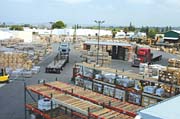

As one of the first suppliers of Indian granite to the U.S., MS International (MSI) has been a contributor to the growth of the industry. Although MSI began as an importer and distributor of Indian granite, today it is one of the largest distributors of natural stone in the country. MSI currently has one of the largest stocks of natural stone with over 20 million square feet of granite, marble, slate, travertine and limestone from over 25 countries. The inventory of tiles, slabs, landscaping products and monuments is stocked in five distribution centers located strategically across the country.
Founded by the husband-and-wife team of Manu and Rika Shah in the small town of Ft. Wayne, IN, MSI will be celebrating its 30th anniversary next year. “When we brought the first lot of material from India, it was monuments and surface plates, and then some rough blocks,� Shah said. “The stone was Premium Black granite or what was known at that time as Absolute Black. South Africa was having problems [supplying black granite] at the time, so there was success from India. Also, the composition and formation of Indian black granite made it superior to many others.�
In 1982, MS International brought national publicity to Indian granite when it supplied Premium Plus black granite for the Vietnam War Veterans Memorial in Washington, DC, which was fabricated from Premium Plus granite. “That gave us some insight into how to get into the slab market,� Shah said, although he said it took awhile for the stone to become popular for residential construction. “Black granite was popular in monuments, but it wasn't until the late 1980s that black slabs and tiles became popular in the construction industry.�
Shah moved his base of operations to Southern California in 1984, and MSI opened its own 6,000-square-foot warehouse in 1987. That same year, the company introduced Black Galaxy granite -- which was quarried and processed in India by Enterprising Enterprises -- to the U.S. marketplace. The stone eventually became trademarked, and it became one of the most popular granites in the U.S.
The company's selection of materials steadily increased, as MSI began bringing in Italian stone as well as multi-colored Indian slate in 1987. The company started importing Norwegian granite in 1989, and it also expanded into crosscut travertine from Mexico in the early '90s. Another introduction was classifying products under the general term, “natural stone,� according to Shah. “That was a significant change, and by 1995 and 1996 this name was in vogue. Marble and granite became known as 'natural stone.' “
In 1994, MSI opened a new location in Chicago, IL, followed by locations in New Brunswick, NJ, (now Edison, NJ) in 1998; Atlanta, GA, in 2002; Dallas, TX, in 2003; and a sales office in New England, also in 2003. Earlier this year, MSI's headquarters moved to a 13-acre site in Orange, CA, which has 550,000 square feet of indoor/outdoor storage space, including 180,000 square feet of covered area. Shah said that MSI is continuing to look for strategic areas in which to open new locations.
In determining locations for its facilities, MSI looks for areas where one company is dominant, and it looks to “chip away� at that dominance. It also pays attention to market breakdowns by region. “The East Coast is a strong market for tiles; for granite and polished marble,� Shah said. “Due to our strength in Indian and Chinese products -- which are generally polished granites and marbles -- it was clear that we had to be there. In California, Arizona or Nevada, you have more of a honed and natural market, so we had to sell slate and travertine.�
The company has 200 “teammates� in the U.S. and 20 more in various countries, including India, China and Turkey. These workers are involved in sourcing, quality control and coordination of shipments. According to Shah, personnel challenges are the same today as they were 20 years ago. “The most difficult part is finding good people and keeping them motivated,� he said. “This is true for expansion. The market, material and finances are there, but finding and training employees is a challenge.�
MSI is focused on the distribution of natural stone. Shah attributes much of the company's success to staying focused on MSI's “core competencies.� The company only distributes natural stone, and it has not entered the retail arena.
Shah reports that MSI will sell close to 6,000 containers of stone in 2004. This follows 11 straight years of growth, over which the company's volume increased by a factor of 10. Today, the majority of MSI's product comes from countries including India, Turkey, Brazil, China, Mexico and Spain. The company has also significantly diversified its product offering, which today includes slabs, tiles, landscaping products and monuments made of natural stone.
In addition to the traditional distribution channels for natural stone, MSI supplies many other customers. This includes the major “big box� retailers, the large soft-flooring co-ops and other customers. In 2002, MSI received the Supply Chain Partnership Award from Home Depot -- given out to one partner per category. In addition, in 2003, MSI was named a master supplier to CCA Global and Abbey Carpets -- both of which have over 1,000 members across the nation.
MSI has a very specific philosophy when it comes to importing and distributing products. “For any definable market segment, the goal is to become one of the top three suppliers of any specific product from a particular country,� Shah said. “So, for example, if we want to bring in granite tiles from China, we look at the major suppliers in the U.S., and within 18 to 36 months, we want to be among the top companies [supplying Chinese granite tiles.] This is true of all products we sell -- from Brazil, Spain, Turkey; even the Philippines or Mexico.
The company strongly believes in introducing new materials to the marketplace, and Shah said that a company goal is that 15% of sales come from products introduced over the past 12 months. “Our perspective is trying to determine what the consumer needs and wants,� he said. “People want choices in types, finishes, colors and sizes. Right now, people want larger stones. There are 450 to 500 stones at MSI, and then you have choices of size and finishes, which add even more variation. [In the future,] even more stone types will come to America. We are seeing larger slabs for kitchen countertops, since homeowners are now looking for counters without seams. There are also more designs in backsplashes, etc.�
MSI's other strong philosophy is the belief that it is in the “information business.� “Customers today want answers and solutions immediately, not tomorrow and definitely not next week,� Shah said. Due to this, the company has significantly invested in state-of the-art technology. This includes information systems, databases, communication channels and digital electronics. “The technology exists, its our job to implement it into the way we do business,� Shah said.
Shah strongly believes in continued improvement and efficiency gains. “We live in a dynamic age with business practices continually changing. It is our job at MSI to continue to look for ways to improve our business and the way we function. If we stop looking for ways to improve, someone else will find a way to do it,� he said. “As the price of natural stone continues to fall, it is important to find ways to improve our efficiency in order to stay competitive.� MSI spends significant time researching alternative methods of importing, warehousing and distributing natural stone in order to benefit the customer.
Today, MSI strongly follows the philosophies of its founder. “Success or failure in this industry is based on finding where you have competitive advantages, building a business model around it and staying focused,� Shah said.